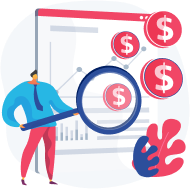Simplify your finances! See how accounting software ensures accuracy, minimizes errors, and optimizes financial record management for your business. :
Proper financial records are significant in any business. Information is used in formulating fundamental decisions, determining the profit-making capability, and ensuring regulations compliance. However, accounting procedures, which by necessity have to rely on human input, become prone to errors at some point, such as at the data entry level or in arithmetic errors that may be perpetrated during the accounting process. Therefore, accounting software will assist businesses increase accuracy, reduce errors, and save time because most tasks are automated by this traditional process.
You’ll learn in this tutorial how accounting software improves accuracy in financial management and avoids the most common errors in accountancy through automation, real-time data processing, integration, and others.
1. Automation of Data Entry
One of the greatest advantages of accounting software is that it has the auto-entry of data feature. This will save users from such tiring tasks of data entry as they do not need to input the numbers in spreadsheets or ledgers. Accounting software allows users to import any data related to transactions, invoices, or other types of data directly from a bank feed, point-of-sale system, or others.
Why It Reduces Errors: Manual data entry is labor intensive and prone to errors. A number of typos and an incorrectly placed decimal can make all the difference in financial record accuracy. Automation eliminates repetitious data entry; therefore, the probability of such mistakes is decreased.
How it works: Accounting software allows users to easily connect their bank accounts, credit card providers, among others directly in the software. All their transactions are then automatically fetched and categorized, thereby being approved in a couple of clicks for easy processing, with more time being saved with increased accuracy and faster data entry, hence less errors.
2. Real-time Data Processing
It is on this basis that timely information appears to be the only thing that really matters, particularly for accurate financial management. Accounting software functions based on real-time data processing; with each new transaction added or modified, the financial records are updated right away. This type of real-time data processing is critical for businesses that require current information in order to manage and make decisions effectively.
Benefits of live data include no dependency on month-end updates for tracking cash flow and expenses; also, sales reviews can be tracked. Responses can actually become faster in the event any financial issues arise, thereby minimizing the chances of errors that may influence cash flow or budgeting.
How It Works: The accounting software continuously updates records based on new information that it receives—through automatic import or through manual entry. This means the financial statements, balance sheet, and income statement will always reflect the business’s financial situation accurately at any point in time.
3. Integration with Other Systems
In modern accounting software, there is some level of integration into other business systems, for example, with customer relationship management (CRM) software, inventory management systems, as well as payroll platforms. Data also does not have to be doubly entered in such systems to avoid duplication and errors.
Why Integration Matters: Without integration, you have to input all your information in each system manually. This puts you at an increased risk of inconsistencies. With the integration of accounting software, the flow of data between different systems minimizes the chances of a wrong entry.
How It Works: Most accounting software packages come pre-integrated, or third-party integrations are allowed. To give an example, sales data from an e-commerce platform can go straight into the accounting software, updating the accounting records with revenue figures. Much manual inputting goes away where this integration works closely together smoothly, helping save time and contributes better accuracy.
4. Built-in Validation and Error-Checking Features
The accounting software improves the accuracy with built-in validation and error checking, which are features that can automatically detect irregularities and flag them as possible errors. Users have the chance to prevent error before it affects any financial records.
How Does it Reduce Errors? Validation tools check entries for “logic and consistency.” For example, this software may bring up the cost category as too high, thereby alerting you to review the entry again. Thus, due to this, errors are caught before they happen or go unnoticed until financial reports are generated.
Like any accounting software, it is designed with so many controls in it: warning one about duplicate entries, checks for mismatches in balance, and alerts for some unusual spending patterns. Such things are meant for that essential layer of security that makes it possible for businesses to make early corrections in a process of error happening.
5. Secure and Consistent Data Storage
One of the consequences of keeping the data storage consistent is that the information will be accurate. Accounting software is preferable since it assures safe and organized financial data storage; one can easily access, monitor, and review the record.
Why must the data storage be safe? Financial data should be accessible and at the same time safe. In case they are spread across files or locations, there are greater chances of losing some important information; this might result in producing errors or failure to pass the rules.
How It Works: Accounting software automatically saves all financial records in one main encrypted database. Uniform saving of this data helps monitor transactions, financial histories, and confidentiality over data. Many cloud-based solutions include backup features, so your data will be safe when the system crashes.
6. Customizable Reporting and Analysis
Through accounting software, accuracy is not just in ensuring that the amount of each transaction is or was correctly recorded, but it digs deeper into revealing trends which will aid a business in strategic decision-making. Reporting tools allow companies to generate reports by tailoring them to meet their needs, thereby giving a clearer view of how the business has financially performed.
Through More Accurate Precision: The user can focus their attention on specific data—whether it’s monthly expenses or revenue by product line—with reports and isolate those metrics so that the business can pick up on trends and discrepancies that would probably go unnoticed otherwise in reports that capture more information.
How It Works: Most accounting software offers options to create and customize reports. Users can use parameters, filters, and data sets to generate different types of reports, such as cash flow and profit margin reports. The flexibility of these customizable reports simplifies identification of potential issues that may exist and correct them, thus giving better accuracy in financial records.
7. Cloud-Based Accessibility and Collaboration
Many cloud accounting software products are designed to work on any internet-enabled device, thereby making them available to anyone with an internet connection. This way, team members, accountants, and stakeholders can provide input together, regardless of their location.
This is why collaboration on financial data really works: It would take up much of the time of the team members or external accountants to check and verify the information where financial data exists in one place. By the use of cloud-based software, users can collaborate on financial records in real-time, improving response times and minimizing errors, as each person will have access to the correct data.
How It Works: Multiple users can access and update records in cloud accounting software. Permissions can be set on transactions to limit who can view, edit, or approve them. The outcome is a strong, real-time collaboration that rules out back-and-forth emails and ensures that everybody is working with the latest information.
8. Regular Updates and Compliance
Probably for this reason, it is very important for a business to comply with regulations and the accounting software proves useful where updates about tax codes, standards of financial reporting, and other forms of regulatory changes exist. Due to continuous software update, businesses are ahead of the game by having the latest tools of compliance at their disposal.
Why It Matters: Maintaining compliance with tax rules and accounting standards will at all times help avoid fines and, worse yet, audits. Outdated information may compromise reporting and result in hefty penalties and a ruined reputation.
How it Works: A majority of accounting software developers update their application software periodically to keep in par with regulatory compliance. Most of the updates include fresh templates for reports, changes in tax calculation, and other features that can help an organization comply with varying standards. Using updated software keeps a business compliant without necessarily monitoring regulatory changes personally.
Conclusion
The point is that accuracy and minimization of error can be achieved with the help of accounting software. It has automation features, real-time data processing capabilities, integration, error-checking tools, and secure data storage. Generally speaking, financial records are vital for the correct decision-making, compliance, and planning of small businesses. Since accounting software now supports streamlining collaboration, simplifying compliance, and custom reporting, it supports the maintenance of reliable financial records for businesses.
Investing in accounting software would be very wise because business organizations always look for areas where improvements could be made on the accuracy and efficiency of financial procedures. The accounting software automates routine work, data will be uniform, and helps in collaborative efforts that will keep your finances organized and error-free.
Looking for accounting software to streamline your financial processes? Explore the tools on Zoftware to make the perfect choice. Use our Compatibility Checker to find software that fits your business needs, consult Zain, our AI-powered software expert, or Talk to an Expert for personalized recommendations. Zoftware simplifies financial management—start improving accuracy and reducing errors today!




